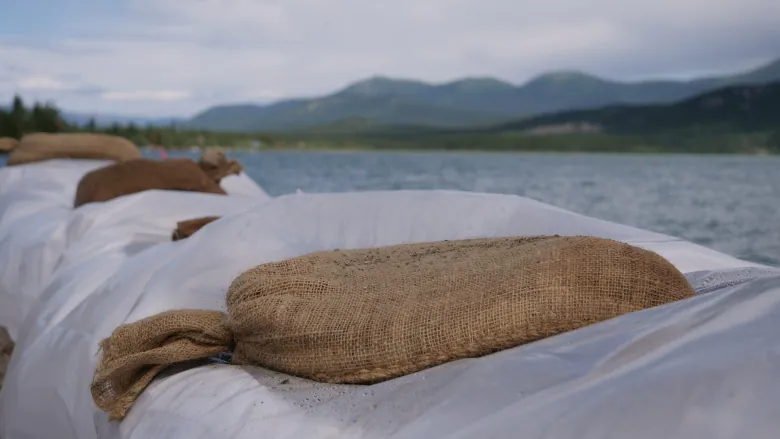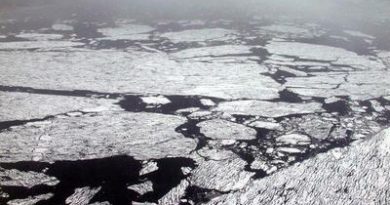Just over 20% of health facilities in Yukon, Canada at risk to future flooding, report warns

– The story is by Kate McGillivray , CBC News
A report out last month suggests the territory needs to start looking decades ahead when it comes to flooding
Flooding has been an immediate and pressing concern for Yukoners so far this summer, with some people now finding themselves under an evacuation alert as water levels near their homes creep up.
But a report out last month from Canadian Institute for Climate Choices (CICC) suggests that when it comes to floods, the territory needs to start looking decades into the future as well.
Researchers at the institute looked at how many health centres in Canada are built in areas that put them under threat of being affected by floods occurring 20, 50 and 100 years from now.
“We found that the Yukon has the highest percentage of healthcare facilities at risk out of any province or territory in Canada,” said Dena Coffman, a research assistant who worked on the report.
Coffman explained that health facilities can mean hospitals, along with clinics and long-term care homes.
The difference between Yukon and other provinces and territories is substantial, with 21 per cent of facilities in the territory at risk of being affected by rising water in 20 years.
The next most at-risk is Manitoba, where eight per cent of facilities are at risk in the next two decades, rising to 18 per cent in 100 years.
“Yukon’s high percentage of facilities in the floodplain and small total number of facilities illustrate how weather-related disasters driven by climate change could disrupt and damage important health infrastructure when it is most needed,” says the report.
The two other territories also have a small number of health facilities overall, but have a lower risk of flood damage: in 100 years, four per cent health facilities will be at risk in Nunavut, and 10 per cent will be at risk in the Northwest Territories.
A ‘deadly cascade’
The Canadian Institute for Climate Choices is a federally-funded institute that has independent control over its research and reporting on climate policy.
Its new report, called “The Health Costs of Climate Change,” attempts to spell out how hotter, wetter and wilder weather will impact the health of Canadians, from deteriorating mental health to population displacement.
“We are trying to anticipate what the impacts of climate change could be,” said Coffman.
She described the delicate web of supply chains and road access that link health facilities to patients and materials — and the potential for problems if any part of that web is disrupted.
“If a flood occurs … and affects the supply chain, a hospital in a different community could still feel that effect,” she said.
The report itself puts it more bluntly.
“During past floods in other countries, disruptions have created a deadly cascade, with health facilities facing both diminished capacity and increased demand,” it says.
Plans to improve flood mapping, building code
The CICC report ends with wide-ranging recommendations for government to begin preparing for the worst health impacts of climate change, including updating building codes to improve resilience to flooding and extreme heat.
“We’re not laying out recommendations for what places should do tomorrow,” said Coffman.
“From what we found, we need to rethink both the where and the how of where we are building our homes and our hospitals and our schools.”
She finds reason for hope in Yukon’s climate strategy, the draft of which was first unveiled in 2019. It includes a number of flood-specific pledges.
That includes a number of short-term plans, a government spokesperson told CBC, like developing flood probability maps for all Yukon communities by 2023, and adopting new building standards by 2030.
“Flood planning across Yukon is a Yukon government priority,” the spokesperson wrote in a statement.
“We know that climate change is behind an increasing amount of extreme weather events, such as flooding, that will affect communities, people and buildings.”
Related stories from around the North:
Canada: Climate change could fuel increase in mosquito-borne viruses in Canada’s Northwest Territories, say officials, CBC News
Finland: Sami, environmental groups weigh in on Finland’s Climate Act reform, Yle News
Greenland: Tipping points: can a leaked report tip the scales to climate action? Blog by Irene Quaile
Norway: Shipping, climate & business opportunities in the North: Q&A with the Arctic Economic Council, Eye on the Arctic
Russia: Record-warm Arctic summer fatal to wild reindeer in Russia, say environmentalists, The Independent Barents Observer
Sweden: Sweden’s wildfire season later than usual, Radio Sweden



